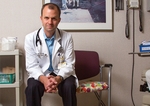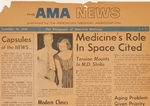business
Writing your way to a bigger physician brand
■ Doctors can remake themselves into authors or use books to market their practices. But the process is tougher than it looks.
For centuries, scientists have been expressing their unique perspectives about living and dying on paper. For physician writers, it is often about teaching medicine’s secrets to others. And physician writers like Anton Chekov have penned literary feasts with their words.
Some doctors describe this tug to create as something they always wanted to do; for others, it starts with a hankering to tell a story, be it memoir, scientific discovery or a way to help patients and families cope with devastating diagnoses. A burning need to get information about breast density to the public beyond the scope of her patients led Stacey Vitiello, MD, to publishing. “I decided the best way was to write a book,” said Dr. Vitiello, a breast imaging specialist at Montclair Breast Center in New Jersey, who admits she knew nothing about the book-writing process in the beginning.
And while many dream of fame and fortune, not every physician with a book will be like Abraham Verghese, MD, the senior associate chair at Stanford University’s School of Medicine in California, who, with his published memoir, My Own Country: A Doctor’s Story of a Town and Its People in the Age of AIDS, hit The New York Times notable book list. More recently, his first novel, Cutting for Stone, sold over 1 million copies and was on The New York Times paperback fiction list for more than two years. Certainly, there are only going to be so many Mehmet Oz, MDs, with books, television shows and other appearances to make them a household name.
But publishing can offer another kind of reward for physicians: something to show their knowledge and personality, in a form that is easy to use as a marketing link to what they do in practice. The career-building advantages of a book, often coupled with a blog and social media presence, can be profound, said Julie Silver, MD, associate professor in the Dept. of Physical Medicine and Rehabilitation at Harvard Medical School in Boston and chief editor of books at Harvard Health Publications. She founded and directs the Harvard Writer’s Conference for physicians. “Think of publishing as a way to advance your career and become a leader in your field,” she said.
Defining the purpose
When a doctor says, “I want to be a writer,” said Richard C. Senelick, MD, medical director of the Health South Rehabilitation Institute of San Antonio and editor in chief of HealthSouth Press, he responds, “What do you want to do with your book?”
That question can help a physician, especially one new to writing, start to focus on what — and why — he or she wants to write. Doctors should know that it’s not an easy process.
Only an intrepid, impassioned heart can endure the long, solitary days until the book is completed. Do you have the stamina and enough information to sustain such a lengthy tome? “My last book was 80,000 words, and I write about 300-500 words an hour,” said Marc Halley, CEO of Halley Consulting Group in Westerville, Ohio. “Where will you find those time blocks to write? You need to ask yourself if you have the passion and the time.”
No matter what the topic, consider your audience. A story written for risk-taking teens will be vastly different from a story for elderly men who smoke. If you have not considered your audience, this is the time. Ask yourself who will read this book. “If you don’t have a clear target, it will be difficult to pitch,” said Rodger Roeser, founder and CEO of the Eisen Agency, a marketing group in Newport, Ky.
Dr. Senelick has published six books and writes regularly online for The Atlantic, the Huffington Post and WebMD. He suggests that before tackling a book, a physician start smaller, say with a blog or blog entry. “You don’t even need to create your own platform,” he said. “If you are affiliated with a hospital, link in with them until you are ready to have your own site.”
A blog or other online presence can help build a physician’s name brand and advertise expertise. After Rep. Gabrielle Giffords was shot in 2011, Diane Sawyer of ABC World News called Dr. Senelick as an expert for her story on the then-Arizona congresswoman because the neurologist who specializes in neurorehabilitation had published online posts about her recovery.
Platform before the proposal
Experts suggest that as soon as you know your topic, start building your audience. Building momentum also can happen with social media. “Twitter is a place to build relationships with journalists,” said Rusty Shelton, founder of Shelton Interactive in Austin, Texas, which helps physician authors get noticed.
It is much harder for new authors to break in, Shelton said. “The best way is no longer just a book; you need a website and a blog. When you build this platform, you have leverage and prove there is an audience for your message.”
When Dr. Vitiello first entertained the idea of a book, she had no idea where to begin. So she signed up for the Harvard Writing Course for physicians. “The whole idea seemed overwhelming,” she said. “What I realized was that without a platform one was dead in the water.”
So she took the plunge and hired Shelton to bring her into the digital age with a website, Twitter and Facebook. On Shelton’s advice, Dr. Vitiello also began writing online for the Atlantic.com and KevinMD.com, a physician web site. Additionally, she signed up with a site that pairs media with experts.
In two years, she went from complete anonymity to being named the No. 2 online influencer making a difference in the battle against breast cancer by Dr. Oz’s Sharecare, a site that allows health experts to answer submitted questions. She now has a literary agent and is finishing her book proposal. “I did spend time and money,” she said. “It was completely worth it. … My patients love it!”
If a doctor is going to write an idea-driven book, like a prescriptive book — a new kind of diet, a new plan of living with diabetes, a new plan of mental wellness — he or she needs some kind of platform. Regular appearances on radio or TV or regular lectures at major conferences are “pretty vital for most of the major publishing houses,” said Daniel Lazar, literary agent at New York’s Writers House. “Also, the doctor being able to articulate why this book idea is new or different or unique from what’s come before it is important.”
Prescriptive nonfiction is usually sold with a nonfiction book proposal, Lazar said. “Even if the doctor isn’t a real writer, if the idea and platform are strong enough, most literary agents can match [the doctor] with a freelance writer who can actually do the legwork in translating the doctor’s ideas into proposal format.”
Publishing and marketing
The digital world has transformed publishing.
Consider eBook publishing through Kindle Direct. Or print on-demand publishing with CreateSpace or On Demand Publishing. Or how about going to one of the newest, espresso book machines in bookstores like Books-A-Million? You can print a copy of your book right in the bookstore. You can buy your own International Standard Book Number, a unique identifier, for $125, and even get Amazon to develop a book cover and marketing strategy for you. And for a fee, you can sign with worldwide content distribution networks to distribute your book.
Long frowned upon by literati elite, self-publishing is gaining ground as indie authors’ books move into more traditional realms like The New York Times best-sellers list, and the authors get six-figure deals with major publishing houses after early self-publishing success.
The downside is that a glut of self-published books — about 20,000 new self-published books come out each week — make it hard to stand out from the crowd. As a self-published author, you are your own sales force as well. If you didn’t like selling fund-raising candy bars as a kid, you probably will not like selling your own book.
“Make sure you have a lot of time and money,” said Roeser, who suggests hiring a publicist. “Marketing on the low end can run $50,000. Fees for a satellite media tour (an author sits in one location and does a series of interviews with TV and radio around the country) are $30,000 for half a day.”
Conversely, if you want books for your patients and the local market, you can send your manuscript digitally to CreateSpace, and then purchase 100 of your own books for about $350 for speaking engagements and other venues. Contact your local paper and book reviewer, schedule talks at local organizations, and bring books to give away or sell.
Many emerging authors shy away from traditional publishing, fearing rejection. But most agents are eager to hear from new talent, said Lazar of Writers House. “Usually a well-written email or letter about the book and doctor’s expertise, maybe with a few sample pages and/or an outline,” he said. “That is enough to attract most agents’ interest, and they’ll respond in kind if the writer is making a well-written case for the book”
If the book is writer-driven, like a memoir or a novel, it is all about the writing, he said. “Being a doctor definitely adds a layer of authenticity to a story if there’s a medical theme or plot in the book,” he said. “But the writing has to speak for itself first and foremost. … Similar to this, I think, are the lovely books by Atul Gawande [MD], which explore logistical and philosophical questions about what it means to be a doctor. The success of these books is largely based on the author’s innate ability as a natural, gifted writer.”












